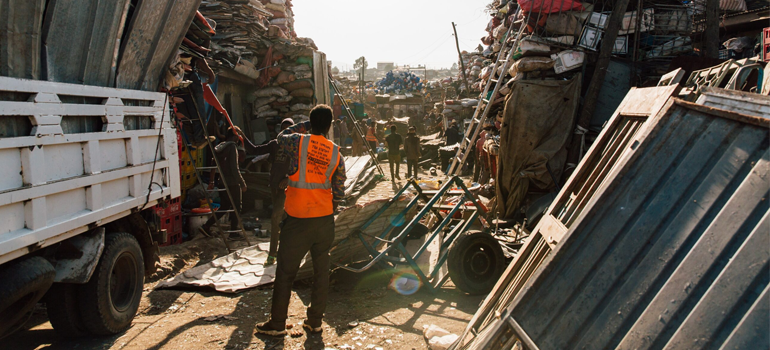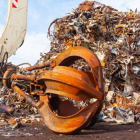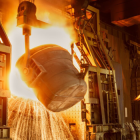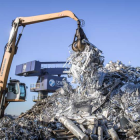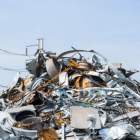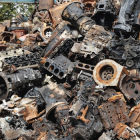A successful day begins with careful planning. Most scrap buyers start their mornings by reviewing market trends and commodity prices. The value of metals like copper, aluminum, and steel fluctuates daily based on global demand and supply.
* Check Market Reports: Scrap buyers rely on tools and resources like the London Metal Exchange (LME) or industry-specific apps to stay updated on pricing trends.
* Schedule Appointments: Many buyers schedule visits to scrapyards, industrial sites, or residential properties where scrap materials are available.
* Prepare Equipment: Essential tools such as magnets, metal analyzers, and personal protective equipment (PPE) are packed and ready for the day ahead.
Key Task: Buyers analyze which metals are in demand and prioritize sourcing those materials to maximize profitability.
Mid-Morning: Site Visits and Inspections
Once the groundwork is laid, the day transitions into fieldwork. Scrap buyers spend much of their time visiting various locations to inspect and purchase materials.
Scrapyard Visits
Scrapyards are treasure troves for buyers, offering a mix of metals ready for recycling. Buyers sift through piles of scrap to identify valuable metals like copper, brass, or aluminum.
* Using Tools: Magnets are used to distinguish between ferrous and non-ferrous metals, while analyzers help determine metal purity.
* Negotiations: A key skill for scrap buyers is negotiating prices with scrapyard owners or suppliers to secure materials at competitive rates.
Industrial Site Pickups
Some buyers partner with manufacturing companies or construction sites to collect leftover metal scraps. This can include anything from old machinery to discarded wiring.
* Evaluating Scrap: Buyers must assess the quality and quantity of the scrap before offering a price. This requires a sharp eye and experience in distinguishing valuable metals from less profitable materials.
* Building Relationships: Maintaining good relationships with suppliers is crucial for securing consistent, high-quality scrap.
Afternoon: Transport and Logistics
Once deals are finalized, the focus shifts to transporting purchased scrap to processing facilities.
* Organizing Shipments: Buyers work with logistics teams or use their own vehicles to transport materials safely and efficiently.
* Sorting and Categorizing: At the recycling facility, metals are sorted into categories (e.g., ferrous, non-ferrous) to prepare for processing.
Challenges: Scrap buyers often deal with logistical hurdles, such as coordinating pickups from multiple locations or managing unexpected delays in transportation.
Late Afternoon: Administrative Tasks
As the day winds down, scrap buyers return to their offices or homes to handle the administrative side of the job.
* Documentation: Buyers record their purchases, noting the type, weight, and price of each material. Accurate records are vital for tracking profitability and complying with industry regulations.
* Invoicing and Payments: Ensuring timely payments to suppliers and receiving payments from clients is another critical responsibility.
* Market Analysis: Reviewing the day’s transactions helps buyers assess market trends and prepare for future opportunities.
Key Task: Staying organized and maintaining transparency in transactions builds trust and strengthens business relationships.
Evening: Networking and Industry Updates
The scrap metal industry thrives on strong connections and staying informed about the latest developments. Even in the evening, scrap buyers often engage in networking activities.
* Connecting with Clients: Buyers may touch base with regular suppliers or reach out to potential clients to expand their network.
* Attending Industry Events: Scrap buyers often participate in trade shows or webinars to stay updated on industry advancements and build professional relationships.
* Researching Innovations: Keeping an eye on emerging recycling technologies or trends ensures buyers stay ahead in a competitive market.
Challenges Faced by Scrap Buyers
The life of a scrap buyer is not without its challenges. Some common hurdles include:
* Fluctuating Prices: Scrap metal values can vary significantly, making it difficult to predict profits.
* Competition: Buyers often compete with others in the industry for high-quality scrap.
* Environmental Concerns: Ensuring sustainable practices and complying with environmental regulations is a constant focus.
The Rewards of the Job
Despite the challenges, being a scrap buyer is a rewarding career. It combines the thrill of sourcing valuable materials, the satisfaction of contributing to environmental sustainability, and the opportunity to build lasting relationships within the industry.
* Economic Impact: Scrap buyers play a vital role in supporting the recycling industry, which reduces the need for mining and conserves natural resources.
* Career Growth: With experience, buyers can advance to managerial roles or start their own recycling businesses.
Conclusion
A day in the life of a scrap buyer is a blend of strategy, fieldwork, negotiation, and logistics. These professionals are the backbone of the recycling industry, ensuring that scrap metals are efficiently sourced, sorted, and recycled. For anyone considering a career in this field, it offers a dynamic work environment and the chance to make a meaningful impact on the planet. By understanding the challenges and opportunities faced by scrap buyers, we gain a deeper appreciation for the work that goes into turning waste into wealth. The next time you recycle, remember the hard work of the scrap buyers behind the scenes who make it all possible.

